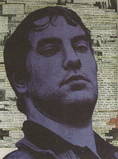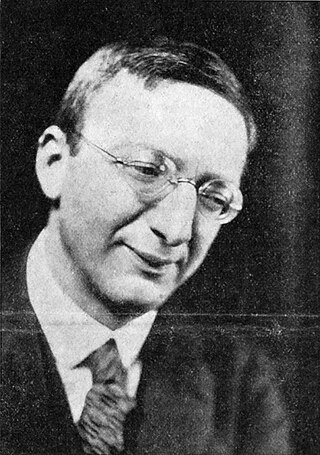
German literature comprises those literary texts written in the German language. This includes literature written in Germany, Austria, the German parts of Switzerland and Belgium, Liechtenstein, Luxembourg, South Tyrol in Italy and to a lesser extent works of the German diaspora. German literature of the modern period is mostly in Standard German, but there are some currents of literature influenced to a greater or lesser degree by dialects.

Marcel Reich-Ranicki was a Polish-born German literary critic and member of the informal literary association Gruppe 47. He was regarded as one of the most influential contemporary literary critics in the field of German literature and has often been called Literaturpapst in Germany.

Rolf Dieter Brinkmann was a German writer of poems, short stories, a novel, essays, letters, and diaries.

The Tin Drum is a 1959 novel by Günter Grass, the first book of his Danzig Trilogy. It was adapted into a 1979 film, which won both the 1979 Palme d'Or and the Academy Award for Best Foreign Language Film in 1980.

Martin Johannes Walser was a German writer, especially known as a novelist. He began his career as journalist for Süddeutscher Rundfunk, where he wrote and directed audio plays. He was part of Group 47 from 1953.

Bruno Alfred Döblin was a German novelist, essayist, and doctor, best known for his novel Berlin Alexanderplatz (1929). A prolific writer whose œuvre spans more than half a century and a wide variety of literary movements and styles, Döblin is one of the most important figures of German literary modernism. His complete works comprise over a dozen novels ranging in genre from historical novels to science fiction to novels about the modern metropolis; several dramas, radio plays, and screenplays; a true crime story; a travel account; two book-length philosophical treatises; scores of essays on politics, religion, art, and society; and numerous letters—his complete works, republished by Deutscher Taschenbuch Verlag and Fischer Verlag, span more than thirty volumes. His first published novel, Die drei Sprünge des Wang-lung, appeared in 1915 and his final novel, Hamlet oder Die lange Nacht nimmt ein Ende was published in 1956, one year before his death.
Ralph Frederick Manheim was a Jewish-American translator of German and French literature, as well as occasional works from Dutch, Polish and Hungarian. He was one of the most acclaimed translators of the 20th century, and likened translation to acting, the role being "to impersonate his author".

Frank Schirrmacher was a German journalist, literature expert and essayist, writer, and from 1994 co-publisher of the national German newspaper Frankfurter Allgemeine Zeitung.
Alfred Zwiebel was a German-American landscape, floral, and still-life painter.
The Onion Cellar was a jukebox musical featuring music by the Dresden Dolls which premiered at the American Repertory Theater's venue, the Zero Arrow Theater, in Cambridge, Massachusetts from December 9, 2006 to January 13, 2007. It combined cabaret show, rock concert and drama. It was conceived and written by Amanda Palmer, with Jonathan Marc Sherman, Marcus Stern, Christine Jones, Anthony Martignetti, and the cast. The running time was 1 hour and 45 minutes with no intermission.
Wolfgang Arthur Reinhold Koeppen was a German novelist and one of the best known German authors of the postwar period.

Günter Wilhelm Grass was a German novelist, poet, playwright, illustrator, graphic artist, sculptor, and recipient of the 1999 Nobel Prize in Literature.
Gisela Elsner was a German writer. She won the Prix Formentor in 1964 for her novel Die Riesenzwerge.

The Flounder is a 1977 novel by the German writer Günter Grass. It is loosely based on the fairy tale "The Fisherman and His Wife".

The Box is a 2008 fictionalised autobiography by the German writer Günter Grass. It has the subtitle "Tales from the Darkroom" ("Dunkelkammergeschichten"). In the narrative, the 80-year-old Grass' eight children, at their father's request, record conversations where they say what they think of him. The Box follows the writer's previous memoir book, Peeling the Onion from 2006, which ended in 1959 with the literary success of The Tin Drum. It was followed by Grimm's Words in 2010.
Albatros Literaturpreis was an international literary award given every two years by the Günter Grass Foundation based in Bremen, Germany. It was awarded only five times. The award was for contemporary authors in prose, poetry or essay writing including translated works. The prize was €40,000 split between author (€25,000) and translator (€15,000).
Heinz Ludwig Arnold was a German literary journalist and publisher. He was also a leading advocate for contemporary literature.
The Luchterhand Literaturverlag is a German publisher of contemporary literature based in Munich. It was founded in 1924, and was acquired by Random House in 2001. Luchterhand is considered one of the most prestigious publishers in Germany. Publications include literature from Günter Grass and Christa Wolf and many others.

The 1999 Nobel Prize in Literature was awarded to the German writer Günter Grass (1927–2015) "whose frolicsome black fables portray the forgotten face of history." He is the eighth German author to become a recipient of the prize after Heinrich Böll in 1972.

Günter Grass was a German writer, sculptor and graphic artist. He had an international breakthrough as a novelist with his Danzig Trilogy (1959–1963). He was awarded the Georg Büchner Prize in 1965 and the Nobel Prize in Literature in 1999.













